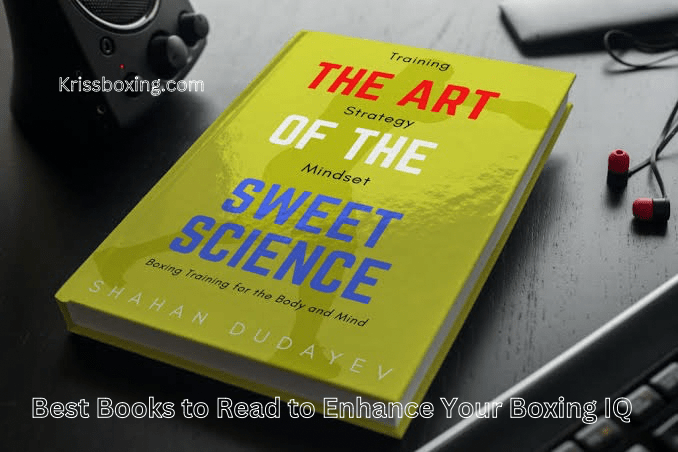The psychological aspect of thinking about the strategy, tactic, and awareness of a fight can be very decisive.
Many of these mental tactics are well described in books which are written by boxers, trainers, and journalists and can double the boxer’s IQ in the ring.
Here are ten of the best books in boxing that will improve your tactical knowledge, moves, and historical background of boxing.
The Boxer with the Highest Boxing IQ
Another aspect that cannot be argued is that Floyd Mayweather has the highest IQ in boxing, to date. This was attributed to by his defensive prowess, anticipation, and efficiency in handling adversaries.
Mayweather skills of making changes in the middle of the fight and take advantage of his opponents’ mistakes prove how he well conversant with the art of boxing.
Best 10 Books to Read to Enhance Your Boxing IQ
“The Sweet Science” by A.J. Liebling
Cited by many people as being one of the definitive boxing books ever written, “The Sweet Science” explores history, culture, and the nuts and bolts of boxing during the golden age of the sport.
In prose, an accomplished journalist called Liebling presents the details of boxing as not merely a fight but as an epitome of society in the 1950s. This book is not only a guide to improve your awareness of boxing strategies, but also a historical account of the sport, which is crucial to improve your boxing wisdom.
“Championship Fighting” by Jack Dempsey
This book gives a lot of practical tactics to win fights and is technically illustrated by one of the most revered heavyweight boxers of all time, Jack Dempsey. It explains basic ways of punch delivery, defense, foot positioning, and other things in great detail.
Again, another element that makes the work valuable for any fighter wanting to raise the ‘boxing IQ’ through the learning of tactics is Dempsey’s learning approach which enhances the understanding and breaking down of moves and strategies.
“Four Kings” by George Kimball
“Four Kings” is a great look into one of the best periods in boxing history, especially when Sugar Ray Leonard, Marvin Hagler, Thomas Hearns, and Roberto Duran dominated the sport.
Comparing basic psychological skills and triaging of these world champions with the techniques of these fighters, the readers will be able to understand what a high level of thinking looks like in the middle of a boxing match.
his book is especially useful to read in learning when to throw and when to parry a punch, as well as how to control a fight.
“The Boxing Bible” by Don Turner
Don Turner is one of the most renowned boxing coaches in the world, and he has trained some of the best boxers. His boxing book, ‘The Boxing Bible,’ is mandatory reading for those who are serious about improving their boxing knowledge.
From the training routines to detailed information on strategies, the book provides readers with a good background not only on the physical aspect but also on the strategic aspect of the game.
What makes this book unique is that it is replete with practical insights and actual ‘how-to’ strategies which is ideal for dedicated fighters.
“The Fighter’s Mind” by Sam Sheridan
In “The Fighter’s Mind”, Sam Sheridan goes for the psychological angle of competitive violence, conducting interviews with various champions and trainers, arguing that mental endurance, concentration, and perseverance are as vital to a fighter.
This book is especially useful for those readers interested in learning how to remain cool during the heat of the battle, how to perform at their best when the going gets tough, and about having a good attitude all of which belong to what constitutes a high boxing IQ.
“The Art of Boxing: Your Guide to the Sweet Science” by Tom Lotta
“The Art of Boxing” also recommended by Tom Lotta provides useful information for people who wish to improve their mental and strategic approach in the sport of boxing.
Explaining the various processes of combat, fighting stances, and mindsets that the readers can use when in the ring, the book is composed.
This feature also deconstructs the physical movements of the sport of boxing, the ebook is therefore useful for both beginners and professionals.
“Rope Burns” by F.X. Toole
While it is a work of fiction and it is a collection of short stories, “Rope Burns,” by F. X. Toole provides the reader with a view into the mental and internal turmoil of fighters.
Knowledge of these aspects can enhance a fighter’s boxing IQ since it will help to develop an ability to be empathic, perceptive, and psychologically strong.
“Boxing in the Shadow” by Thomas Hauser
A masterful collection of essays by Thomas Hauser, “Boxing in the Shadow” looks at the sport from various angles. Hauser’s perspective as a boxing historian provides insights into the strategic evolution of the sport.
By examining fighters of the past and present, readers can gain a better understanding of how the game has changed and what strategies are timeless.
“In This Corner…!” by Peter Heller
Peter Heller interviews 42 of the greatest boxers in history in “In This Corner…!” The stories shared by these legends provide valuable lessons on technique, mindset, and in-ring strategy.
Learning directly from champions gives readers a clearer picture of the thought process required to succeed in boxing. This book is perfect for those who want to combine the tactical with the inspirational.
“Workouts from Boxing’s Greatest Champs” by Gary Todd
For a more practical guide to boxing, “Workouts from Boxing’s Greatest Champs” by Gary Todd is an excellent resource.
While primarily focused on the physical side, understanding the workouts and routines that shaped champions can give you insight into the discipline, endurance, and mental toughness needed in boxing. Enhancing your physical endurance and mental stamina is a vital part of boosting your boxing IQ.
Frequently Asked Questions (FAQs)
What are the most important skills to develop in boxing?
Some of the fundamental skills involve footwork, head mobility, punching, how to defend yourself, and the important timing. A boxer requires all these to function effectively in terms of both attack and defense formations.
How can I improve my footwork in boxing?
There are quite several drills to improve footwork including shadowboxing, ladder drilling, and skipping. Proper body positioning is well preserved by constant concern on staying well balanced and thereby being light on ones feet.
What does discipline mean in boxing training?
Discipline in the context of boxing refers to commitment to a practice regimen, keeping emotions in check during combat, and constant efforts to strengthen the areas of one’s lack of strength. It also implies adhering to a diet and workout regimen to remain physically fit and healthy.
How do boxers develop mental toughness?
This aspect is developed through rigorous practices such as sparring, dexterity, and controlling emotions when under stress. The other important components of mental strength fitness are visualization techniques and improving attention while working on high-intensity programs.
What is the best way to improve endurance in boxing?
Strength and stamina are developed through HIIT, distance running, and repeated sessions of sparring. That is the reason many boxers incorporate stamina exercises to guarantee they’ll be ready for an extended session in the ring.
Conclusion
In this case, it will be helpful to read books on the sport with a focus on the psychological and the analytical sides as this puts you in a position to gain an advantage in the ring.
Here are ten boxing books that stand as key references for anyone interested in knowing boxing beyond the ring
They are written in a style that combines tips on training, psychological approaches, and historical overviews and, as such, each title contributes to the formation of a more capable and interesting boxer and fan.


